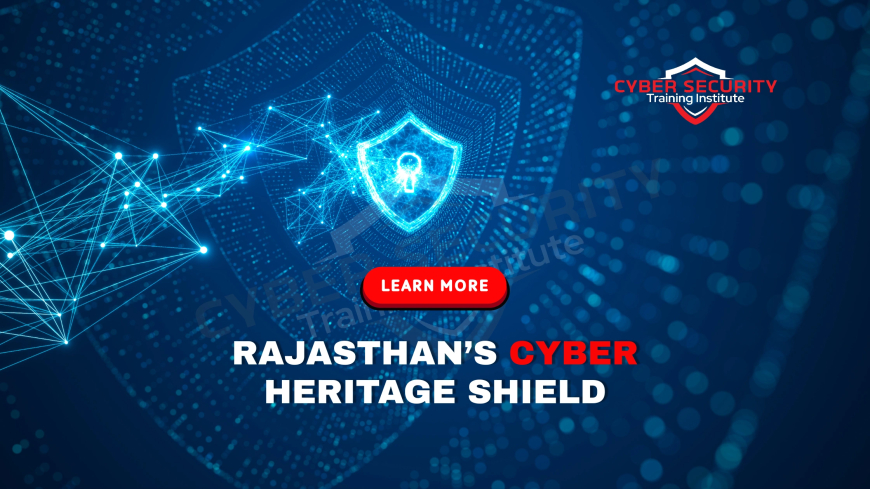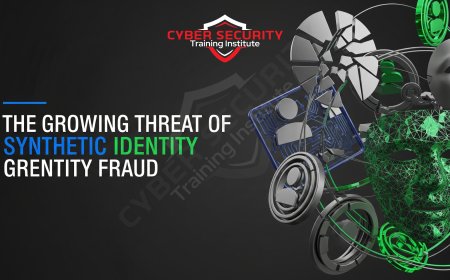Cyber Savvy Rajasthan | Protecting Heritage in a Digital World
Rajasthan, the land of vibrant culture, majestic forts, and timeless traditions, is embracing the digital age with open arms. From the bustling markets of Jaipur to the serene deserts of Jaisalmer, the state is weaving its rich heritage into the fabric of modern technology. But with this digital transformation comes a new challenge: cybersecurity. As Rajasthan’s heritage goes online—through e-commerce platforms selling handicrafts, virtual tours of palaces, and digital archives of folk music—the need to protect this legacy from cyber threats has never been more critical. In this blog, we’ll explore how Rajasthan can stay cyber-savvy while safeguarding its cultural treasures in a digital world.

Table of Contents
- The Digital Transformation of Rajasthan
- Why Cybersecurity Matters for Rajasthan’s Heritage
- Common Cyber Threats Facing Rajasthan
- Steps to Protect Rajasthan’s Digital Heritage
- The Role of Education and Awareness
- Government and Community Initiatives
- Conclusion
- FAQs
The Digital Transformation of Rajasthan
Rajasthan is no stranger to change. Over centuries, it has evolved while preserving its unique identity. Today, the state is undergoing a digital revolution. Artisans in Udaipur are selling handcrafted jewelry on global e-commerce platforms. Tour operators in Jodhpur offer virtual reality tours of Mehrangarh Fort. Even traditional Rajasthani folk music is finding a global audience through streaming services. This digital shift is not just about convenience; it’s about sharing Rajasthan’s heritage with the world.
However, this transformation comes with risks. Every online transaction, every digital archive, and every virtual tour is a potential target for cybercriminals. Protecting Rajasthan’s digital presence is as important as preserving its physical monuments.
Why Cybersecurity Matters for Rajasthan’s Heritage
Rajasthan’s heritage is more than just physical artifacts; it’s the stories, traditions, and craftsmanship passed down through generations. When these are digitized—whether as online catalogs of Rajasthani textiles or digital museum collections—they become vulnerable to cyber threats. A single data breach could lead to the loss of irreplaceable cultural records or damage the reputation of businesses that rely on Rajasthan’s heritage for their livelihood.
Cybersecurity ensures that Rajasthan’s digital heritage remains safe, accessible, and authentic. It protects the trust of customers who buy Rajasthani products online and ensures that the state’s cultural legacy is preserved for future generations.
Common Cyber Threats Facing Rajasthan
As Rajasthan’s digital footprint grows, so does its exposure to cyber threats. Here are some of the most common risks:
- Phishing Attacks: Cybercriminals send fake emails or messages pretending to be trusted sources, tricking users into sharing sensitive information like passwords or bank details.
- Data Breaches: Hackers target websites or databases to steal personal information, such as customer data from e-commerce platforms selling Rajasthani handicrafts.
- Malware: Malicious software can infect devices, steal data, or disrupt online services, such as virtual tours or digital archives.
- Ransomware: This type of malware locks access to data or systems until a ransom is paid, posing a threat to digital heritage archives.
- Identity Theft: Cybercriminals may steal personal information to impersonate individuals or businesses, affecting the credibility of Rajasthan’s online marketplaces.
The table below summarizes these threats and their potential impact on Rajasthan’s digital heritage:
| Cyber Threat | Description | Impact on Rajasthan’s Heritage |
|---|---|---|
| Phishing Attacks | Fake emails or messages to steal sensitive information. | Loss of customer trust in online platforms selling Rajasthani goods. |
| Data Breaches | Unauthorized access to databases or websites. | Exposure of sensitive cultural or customer data. |
| Malware | Malicious software that disrupts or steals data. | Corruption of digital archives or disruption of online services. |
| Ransomware | Locks data until a ransom is paid. | Loss of access to digital heritage records. |
| Identity Theft | Stealing personal or business identities. | Damage to the reputation of Rajasthani businesses. |
Steps to Protect Rajasthan’s Digital Heritage
Protecting Rajasthan’s digital heritage requires a combination of technology, awareness, and collaboration. Here are practical steps that individuals, businesses, and organizations can take:
- Use Strong Passwords: Create complex passwords with a mix of letters, numbers, and symbols. Avoid using easily guessable information like birthdates.
- Enable Two-Factor Authentication (2FA): Add an extra layer of security by requiring a second form of verification, such as a code sent to your phone, when logging in.
- Keep Software Updated: Regularly update websites, apps, and devices to patch vulnerabilities that hackers could exploit.
- Use Secure Websites: Ensure that e-commerce platforms and digital archives use HTTPS, which encrypts data to protect it from interception.
- Backup Data Regularly: Save copies of important digital assets, like cultural archives or business records, in secure offline or cloud storage.
- Train Employees: Educate staff about recognizing phishing emails and other cyber threats to prevent accidental data leaks.
By implementing these measures, Rajasthan’s digital heritage can be safeguarded against cyber threats while continuing to thrive online.
The Role of Education and Awareness
One of the biggest barriers to cybersecurity is a lack of awareness. Many artisans, small business owners, and even tourists in Rajasthan may not realize the risks of sharing sensitive information online. Education is key to building a cyber-savvy Rajasthan.
Workshops and training programs can teach people how to recognize phishing emails, use secure passwords, and protect their online accounts. Schools and colleges in Rajasthan can include cybersecurity in their curricula, preparing the next generation to navigate the digital world safely. Community centers in rural areas can host sessions to educate artisans about safe e-commerce practices, ensuring that their businesses thrive without falling victim to scams.
Government and Community Initiatives
The Rajasthan government has already taken steps to promote digital literacy and cybersecurity. Programs like the Rajasthan Knowledge Corporation Limited (RKCL) offer courses on digital skills, including basic cybersecurity. Additionally, community-driven initiatives, such as local NGOs partnering with tech companies, are helping small businesses adopt secure online practices.
Collaboration is crucial. By working together, government agencies, private companies, and local communities can create a robust cybersecurity ecosystem that protects Rajasthan’s digital heritage while fostering innovation.
Conclusion
Rajasthan’s journey into the digital age is a testament to its ability to adapt while staying true to its roots. From online marketplaces to digital archives, the state is showcasing its heritage to a global audience. However, this digital transformation comes with the responsibility of protecting its cultural legacy from cyber threats. By understanding common risks, adopting practical security measures, and promoting education and awareness, Rajasthan can become a cyber-savvy state that preserves its heritage for generations to come. Let’s embrace the digital world while keeping Rajasthan’s treasures safe and secure.
FAQs
What is cybersecurity?
Cybersecurity is the practice of protecting digital systems, like computers and websites, from cyber threats such as hacking or data theft.
Why is cybersecurity important for Rajasthan?
Cybersecurity protects Rajasthan’s digital heritage, like online archives and e-commerce platforms, ensuring its culture remains safe and accessible.
What is a phishing attack?
A phishing attack is when cybercriminals send fake emails or messages to trick people into sharing sensitive information, like passwords.
How can I protect my online accounts?
Use strong passwords, enable two-factor authentication, and avoid sharing personal information with untrusted sources.
What is two-factor authentication (2FA)?
2FA adds an extra layer of security by requiring a second form of verification, like a code sent to your phone, when logging in.
Why should I update my software?
Software updates fix vulnerabilities that hackers can exploit, keeping your devices and data secure.
What is HTTPS, and why does it matter?
HTTPS is a secure version of a website that encrypts data, protecting it from being intercepted by cybercriminals.
How can artisans in Rajasthan stay safe online?
Artisans can use secure e-commerce platforms, avoid phishing scams, and back up their business data regularly.
What is malware?
Malware is harmful software that can steal data, disrupt services, or damage devices.
How can I recognize a phishing email?
Phishing emails often have spelling errors, urgent language, or suspicious links. Never click links or share information without verifying the sender.
What is a data breach?
A data breach occurs when hackers gain unauthorized access to sensitive information, like customer data or digital archives.
How can Rajasthan’s digital archives be protected?
Use strong passwords, encrypt data, and store backups in secure locations to protect digital archives.
What is ransomware?
Ransomware is malware that locks access to data or systems until a ransom is paid.
Can cybersecurity training help small businesses?
Yes, training helps businesses recognize threats, secure their online platforms, and protect customer trust.
How does cybersecurity affect tourism in Rajasthan?
Secure online booking systems and virtual tours build trust with tourists, encouraging them to explore Rajasthan’s heritage.
What role does the government play in cybersecurity?
The government promotes digital literacy and cybersecurity through programs like RKCL and collaborates with communities to protect digital assets.
Can I sell Rajasthani products online safely?
Yes, by using secure platforms, enabling 2FA, and educating yourself about cyber threats, you can sell safely.
What is identity theft?
Identity theft is when someone steals your personal or business information to impersonate you, often for financial gain.
How can I back up my data?
Save copies of your data on external drives or secure cloud services to ensure you don’t lose important information.
Why is digital literacy important for Rajasthan?
Digital literacy empowers people to use technology safely, protecting Rajasthan’s heritage and businesses in the digital world.
What's Your Reaction?
 Like
0
Like
0
 Dislike
0
Dislike
0
 Love
0
Love
0
 Funny
0
Funny
0
 Angry
0
Angry
0
 Sad
0
Sad
0
 Wow
0
Wow
0















